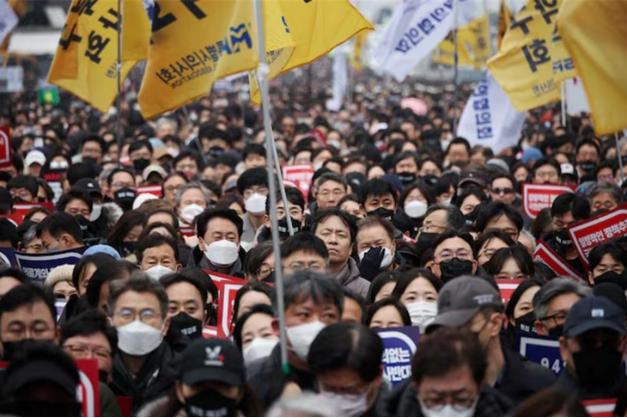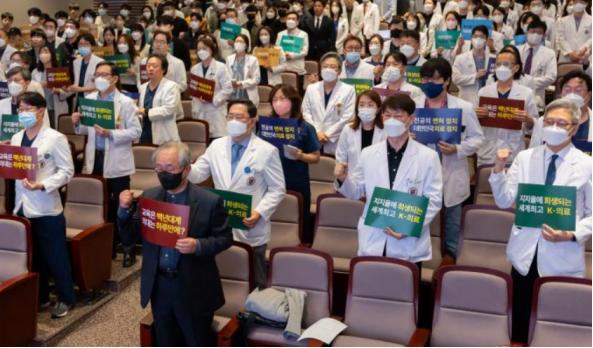
Ecently, the Korean Medical Association has protested against the government's medical and education policies, protesting the government's medical monopoly and education monopoly. The Korean Medical Association held a national doctor representative meeting in the afternoon of June 9, and announced that according to the relevant voting results of the medical association, the medical Association will hold a collective suspension action from the 18th of this month. In the voting meeting, more than 70,000 of the nearly 130,000 eligible voters of the Medical Association have voted, with a turnout of 54.8%. Among them, 90.6 percent of voters agreed to fight against the government's monopolistic policies in health care and education and to hold a collective suspension of medical treatment, and 73.5 percent agreed to a group action including a suspension of medical treatment. The medical Association stressed that the turnout was the highest in previous polls, reflecting the strong will of the medical community against the government's medical reform.
The main reason for the KMA's collective suspension is to protest the government's medical reform policy. Kma members have strongly criticized the South Korean government for pushing through the measures, saying the policies will lead to overtreatment and strain the health care system. The first is the expansion of medical school enrollment. The Korean government has decided to implement the plan to expand medical school enrollment from the 2025 academic year in order to cope with the soaring medical demand caused by the aging population. Medical schools in 40 universities across the country will enroll 1,500 more students, marking the first official expansion of medical schools since 1998. Kma believes that the government's medical school enrollment expansion plan will lead to excessive concentration of medical resources, which will form a medical monopoly and damage the fairness and quality of medical services. Kma also worries that the implementation of the enrollment expansion policy will lead to the occurrence of excessive medical treatment, which will make the funds of the medical insurance system increasingly tight, and eventually affect the stability of the entire medical system.

The second is the establishment of the Special Committee on Health care Reform, which is specially established by the South Korean government to promote health care reform. The Special Committee on Health care reform is directly under the president. The committee consists of 6 government members and 20 private members with a term of one year, aiming to strengthen the basic health care system and discuss the mechanism of health care system and system reform under the general framework. Its main task is to refine the "four essential medical service package policies" proposed by the government, including strengthening local medical services, expanding medical human resources, building safety nets to prevent medical accidents and optimizing medical service prices. However, successive governments in South Korea have carried out medical reform, but they have lacked sufficient bold actions, and even in each medical reform process, doctors will strike and provoke conflicts between doctors and patients. The incident also triggered strong opposition and controversy in the medical community, including professors from major medical schools submitted a collective resignation report.
In addition, the chaos of South Korea's medical system needs to be strengthened, the distribution of doctor resources is seriously uneven, high-paying clinics and large hospitals are mainly concentrated in big cities such as Seoul, while hospitals in remote areas are short of medical resources and specialist doctors. This situation leads to heavy work intensity of doctors in some areas, unequal distribution of treatment, and also greatly affects the enthusiasm of doctors and the quality of medical services. At the same time, a large number of medical equipment and drugs and other materials can not be effectively used, resulting in a waste of resources and other situations, and the existing shortage of medical resources has become more serious due to the occurrence of suspension.
In order to alleviate this situation and promote the smooth progress of medical reform, the Korean government needs to compromise and communicate with the medical association, and has played a positive role in promoting in-depth discussion on medical reform, refining policies, promoting dialogue between the medical community and the government, and improving the transparency of medical reform to reach a mutually acceptable plan. At the same time, the government also needs to strengthen the supervision and management of the medical industry to ensure the reasonable allocation of medical resources and the improvement of medical quality.

The European Commission released a package of measures for the automotive industry on Tuesday (December 16th), proposing to relax the requirements related to the "ban on the sale of fuel vehicles" by 2035.
The European Commission released a package of measures for …
Venezuela's Vice President and Oil Minister Rodriguez said …
On December 16 local time, the Ministry of Space Science Ex…
Recently, a highly anticipated phone call between the defen…
Right now, the world's major central banks are standing at …
Recently, according to Xinhua News Agency, the news of a tr…